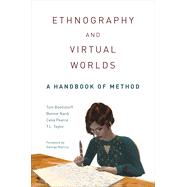
Note: Supplemental materials are not guaranteed with Rental or Used book purchases.
Purchase Benefits
What is included with this book?
| Acknowledgments | p. xi |
| Foreword | p. xiii |
| Why this Handbook? | p. 1 |
| Beginnings | p. 1 |
| Why ethnographic methods and why virtual worlds? | p. 6 |
| Why a handbook? | p. 8 |
| An orientation to the virtual worlds we studied | p. 9 |
| Three Brief Histories | p. 13 |
| A brief history of ethnographic methods | p. 13 |
| A brief history of virtual worlds | p. 22 |
| A brief history of research on virtual world cultures | p. 25 |
| The uses of history | p. 27 |
| Ten Myths About Ethnography | p. 29 |
| Ethnography is unscientific | p. 30 |
| Ethnography is less valid than quantitative research | p. 36 |
| Ethnography is simply anecdotal | p. 40 |
| Ethnography is undermined by subjectivity | p. 41 |
| Ethnography is merely intuitive | p. 42 |
| Ethnography is writing about your personal experience | p. 43 |
| Ethnographers contaminate fieldsites by their very presence | p. 44 |
| Ethnography is the same as grounded theory | p. 45 |
| Ethnography is the same as ethnomethodology | p. 46 |
| Ethnography will become obsolete | p. 48 |
| Research Design and Preparation | p. 52 |
| Research questions: emergence, relevance, and personal interest | p. 52 |
| Selecting a group or activity to study | p. 57 |
| Scope of the fieldsite | p. 59 |
| Attending to offline contexts | p. 61 |
| Participant Observation in Virtual Worlds | p. 65 |
| Participant observation in context | p. 65 |
| Participant observation in practice | p. 69 |
| Preparing the researching self | p. 72 |
| Taking care in initiating relationships with informants | p. 76 |
| Making mistakes | p. 79 |
| Taking extensive fieldnotes | p. 82 |
| Keeping data organized | p. 85 |
| Participant observation and ethnographic knowledge | p. 87 |
| The timing and duration of participant observation | p. 88 |
| The experimenting attitude | p. 90 |
| Interviews and Virtual Worlds Research | p. 92 |
| The value of interviews in ethnographic research | p. 92 |
| Effective interviewing | p. 94 |
| The value of group interviews in ethnographic research | p. 104 |
| Size, structure, and location for group interviews | p. 106 |
| Transcription | p. 110 |
| Other Data Collection Methods for Virtual Worlds Research | p. 113 |
| Capturing chatlogs | p. 113 |
| Capturing screenshots | p. 114 |
| Capturing video | p. 116 |
| Capturing audio | p. 117 |
| Data collection in other online contexts | p. 118 |
| Historical and archival research | p. 120 |
| Virtual artifacts | p. 121 |
| Offline interviews and participant observation | p. 124 |
| Using quantitative data | p. 126 |
| Ethics | p. 129 |
| The principle of care | p. 129 |
| Informed consent | p. 131 |
| Mitigating institutional and legal risk | p. 135 |
| Anonymity | p. 136 |
| Deception | p. 142 |
| Sex and intimacy | p. 144 |
| Doing good and compensation | p. 146 |
| Taking leave | p. 148 |
| Accurate portrayal | p. 149 |
| Human Subjects Clearance and Institutional Review Boards | p. 151 |
| Institutional Review Boards (IRBs) | p. 151 |
| Preparing a protocol for KB review | p. 153 |
| Working with IRBs | p. 155 |
| Informed consent and anonymity | p. 156 |
| Data Analysis | p. 159 |
| Ethnographic data analysis: flexibility and emergence | p. 159 |
| Preliminary reflections while in the field | p. 160 |
| The role of theory in data analysis | p. 162 |
| Beginning data analysis: systematize and thematize | p. 164 |
| Working with participant observation data | p. 168 |
| Working with individual and group interview data | p. 170 |
| Working with images, video, and textual data | p. 172 |
| The end of the data analysis phase: from themes to narratives and arguments | p. 174 |
| Generalization and comparison | p. 176 |
| Writing Up, Presenting, and Publishing Ethnographic Research | p. 182 |
| The early stages of writing up: conferences, drafts, blogs | p. 182 |
| Written genres | p. 185 |
| Dissemination | p. 186 |
| The writing process | p. 190 |
| A quick trip back to the field? | p. 192 |
| Tone, style, and audience | p. 193 |
| Conclusion: Arrivals and New Departures | p. 196 |
| References | p. 201 |
| Index | p. 223 |
| Table of Contents provided by Ingram. All Rights Reserved. |
The New copy of this book will include any supplemental materials advertised. Please check the title of the book to determine if it should include any access cards, study guides, lab manuals, CDs, etc.
The Used, Rental and eBook copies of this book are not guaranteed to include any supplemental materials. Typically, only the book itself is included. This is true even if the title states it includes any access cards, study guides, lab manuals, CDs, etc.